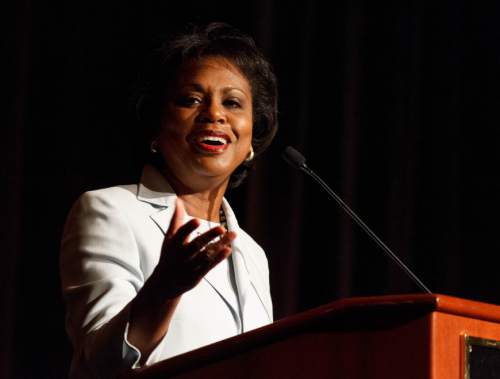This is an archived article that was published on sltrib.com in 2016, and information in the article may be outdated. It is provided only for personal research purposes and may not be reprinted.
Orrin Hatch does not come out of "Confirmation" looking good. But Utah's senior U.S. senator is not alone. Almost no one involved in the 1991 battle over Clarence Thomas' nomination to the Supreme Court is portrayed heroically in the HBO telefilm.
The exception is Anita Hill, whose allegations of sexual harassment failed to keep Thomas off the high court but changed the national conversation about behavior in the workplace.
Hatch (played by Dylan Baker) comes across as a champion of President George H.W. Bush's appointee, not of women. Hill (Kerry Washington, "Scandal") is dragged into the hearings and there's evidence to back her up, but Hatch loudly objects to allowing her to testify.
"You can't hijack the process like that! Not when this woman had months — years! — to speak up!" he says.
Hatch is just one of several GOP senators — including Alan Simpson (Peter McRobbie) and Arlen Specter (Malcolm Gets) — whose behavior ranges from bad to reprehensible. John Danforth (Bill Irwin) raises unfounded allegations that Hill suffers from a sexual disorder; Hatch completely discounts a polygraph test that she passed.
Democratic senators don't fare well, either. Then-judiciary-committee chairman Joe Biden (Greg Kinnear) isn't sensitive to women's issues, and he handles the hearings poorly. Ted Kennedy (Treat Williams) does, eventually, make a stirring speech about the flawed process, but he's largely silenced because — given his history — he can hardly lead the charge against Thomas for his behavior with women.
"Confirmation" (Saturday, 9 p.m., HBO) doesn't make Thomas (Wendell Pierce) out to be a liar. He consistently denies all the charges, but scriptwriter Susannah Grant (an Oscar nominee for "Erin Brockovich") gives voice to allegations that he turned it into a race issue — calling the hearings a "high-tech lynching" — even though his accusers were also African-American.
In the end, "Confirmation" doesn't explicitly state that Hill was telling the truth and Thomas was lying — or vice versa.
"The assumption is that the movie is sort of like — who's telling the truth?" said Washington. "And that is a very provocative question. But one of the things that we learned that was most exciting was when you start to tell this story and you pull back the curtain, the story is way more complicated than just he said-she said."
That it was. Viewers who aren't old enough to remember the Thomas confirmation may come away thinking about those issues.
But those who thought Thomas was lying aren't likely to change their minds after watching "Confirmation." Neither are those who thought Hill was lying.
If Orrin Hatch watches "Confirmation," he will doubtless think he did the right thing.
Others will disagree.
Scott D. Pierce covers TV for The Salt Lake Tribune. Email him at spierce@sltrib.com; follow him on Twitter @ScottDPierce.



